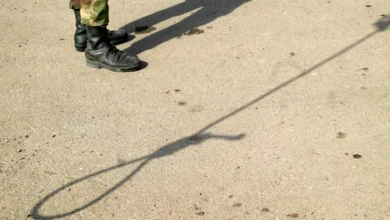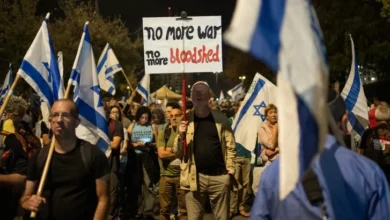‘Justice denied’: Victims’ families slam UK’s Northern Ireland legacy bill

“Hundreds, if not thousands” of investigations into crimes committed during 30 years of conflict in Northern Ireland could be thwarted by the UK’s imminent new law on such cases, human rights groups say.
The British government is set to face a number of legal challenges over the incoming legislation, as Westminster MPs prepare to vote on the controversial Northern Ireland Troubles (Legacy and Reconciliation) Bill.The legislation will shut down new examinations of atrocities and other crimes committed during the Troubles, a prolonged civil conflict that killed more than 3,600 people between the late 1960s and 1998.
One of the most controversial features of the bill is that it provides what many have termed an effective amnesty to British state forces and ex-paramilitaries, which campaigners argue would violate international human rights principles.
The legacy bill returned to the House of Lords on Tuesday and may become law within days.
There is widespread opposition to the bill across all of Northern Ireland’s key political parties, the Irish government in Dublin, as well as victims’ families and numerous civil society groups.Hundreds of existing civil cases, which were set to be blocked by the bill, have been allowed to go ahead after the legislation’s initial proposals were amended.
But many inquest cases and criminal probes that currently sit with a branch of the Police Service of Northern Ireland (PSNI) are set to be transferred to the Independent Commission for Reconciliation and Information Recovery, a new body set up by the British government as part of the incoming law.
More than 900 cases covering nearly 1,200 deaths were moved between different branches of the PSNI in 2014 after a review raised concerns about cases involving British security forces.
The new legislation “threatens to harm Britain’s standing” internationally, according to Alan Brecknell, a case worker at the Pat Finucane Centre – a human rights group advocating a non-violent resolution of the conflict on the island of Ireland.“It doesn’t just have implications for this place. You’re going to have a lot of countries – some of them not as democratised as Britain claims to be – saying, ‘Well, look, if Britain can do this and get away with it, why can’t we?’ And I think that is not a good place for Britain’s standing in the world to be seen to be,” Brecknell said.
‘Red herring’
Much of the media framing around the bill’s proposals and associated controversies in Britain has centred on cases that have seen prosecutions brought against elderly ex-military personnel.
This, however, is a “red herring” in the view of Kevin Winters, a human rights lawyer who has represented relatives of those killed during the Troubles.
Winters told Al Jazeera the British government’s primary motivation for pushing the legacy bill through now is to limit scrutiny of the so-called Dirty War in Northern Ireland – namely, the British intelligence service’s use of informants and agents across both sides of the conflict.“But there’s now something for them to protect because the danger of legacy litigation is exposing the full extent of Britain’s role in the conflict. Up to now, it has been perceived in a somewhat limited fashion,” Winters said.
In his view, the British government would be subject to international processes for war crimes “if the true extent of what they were doing came to light – fighting a proxy war using agents and informants in both Republican and Loyalist circles”.
“That’s why we’re having a legacy bill,” he said.
‘Two-tier system’
A long-awaited report into Stakeknife, the British army’s top agent within the Provisional Irish Republican Army during the conflict, is due to be released over the coming months.
Brecknell highlights that the legislation will also create a “two-tier system” for policing and investigations in Britain where Troubles-related crimes are concerned.“It also shuts down any investigation in Britain,” he said. “It shuts down investigations into the [1993] Warrington bombings, the [1996] Manchester bombing, the [1974] Birmingham bombings, and all those other cases,” he said.
“So, that will leave a very distinctive two-tier policing system in Britain whereby any other murder from the 1970s can be investigated but the Birmingham pub bombings, for example, can’t be,” Brecknell added.
Justice denied
Victims’ groups gathered outside the Northern Ireland Office’s headquarters in Belfast on Tuesday afternoon to reiterate their opposition to the bill.
West Belfast resident Paul Crawford, 66, lost three family members during the conflict.
He told Al Jazeera his 15-year-old cousin, Patrick, was “shot dead as he walked through the grounds of the Royal Victoria Hospital [in Belfast]” in August 1975.Human rights ‘violations’
The legislation may place further strain on British-Irish relations just months after the brokering of the Windsor Framework agreement, which seeks to put an end to a bitter dispute over post-Brexit customs arrangements in the Irish Sea.The government of the Republic of Ireland is currently seeking legal advice regarding a legal challenge it could potentially bring against UK Prime Minister Rishi Sunak’s administration over the bill.
It would be only the second case of this kind brought by Dublin against London at the European Court of Human Rights.
In 1971, it brought the first such interstate case to Strasbourg over the UK’s interrogation techniques of 14 Catholics (known as the Hooded Men), alleging torture.
The ruling has been used by the United States government to defend itself from torture accusations during the Iraq War.
Winters, who is representing a number of the remaining cohort, has argued the PSNI is cynically attempting to “run down the clock” over delays to its decision to investigate torture allegations.The deadline for such probes has been extended to May 2024, following a number of amendments to the legacy bill.
Any investigation that runs past that date will effectively “time out” under the new bill, as Winters believes may happen with the Hooded Men case.
“It’s a complete misnomer to say that it’s all about trying to get closure for families after all these years,” he said.
“The British government has never once taken a proactive step to address any of this until now. And the reason they’re doing it now is the pressure brought to bear on it, ironically, by its own legal system.”
Of the more than 400 complaints with the Police Ombudsman’s office regarding Troubles-era matters, it is thought that 270 will not be completed before the May 2024 deadline.‘A bitter pill’
Ciaran McClean, the son of one of the two Hooded Men represented by the Irish government at Strasbourg more than 50 years ago, points out that an amnesty of sorts has already been voted for by a majority of people in Northern Ireland when the Good Friday Agreement was ratified by a plebiscite in 1998.
“It was a bitter pill to swallow for many people here,” he said. “But we voted to let paramilitaries out of prison in ‘98. That was an incredibly difficult thing for people to do,” he said.
“It set the parameters for the Good Friday Agreement – and now the very same people who opposed it at the time want to step in and change the parameters of what is an international accord.
“This legacy bill is not going to help anything or anyone here. It’s all about serving the interests of the British government,” McClean added.
Meanwhile, Kelly McBride told Al Jazeera hundreds of victims’ relatives face their rights to justice being stripped away from them.
Her 18-year-old brother, Peter McBride, was shot by two British soldiers in 1992.
The pair are two of only a handful who have been jailed for crimes committed during the Troubles, only having served three years of their term for life imprisonment.
“Our Peter’s killers went to jail,” she said. “So, even though the sentence was cut short, we got a wee bit of something. There are hundreds of people whose siblings, parents, whose children were killed who face not ever getting that now. It’s very hard.”











